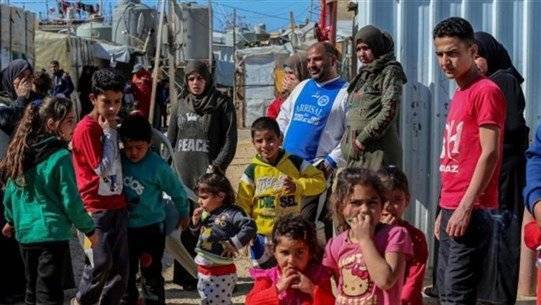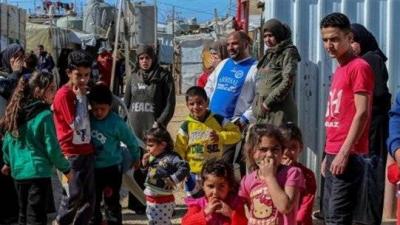The issue of Syrian refugees has re-emerged as a significant topic, with a new political and legal initiative launched by the Lebanese authorities to facilitate their return to Syria in monthly batches. This initiative, which is backed by President Michel Aoun and his political team, appears to have the support of Maronite Patriarch Bechara Rai and Christian leaders, including Samir Geagea, the head of the Lebanese Forces Party. However, it still lacks international guarantees for the safe return of refugees in Syria and social support for them.
Lebanon’s Minister of Displaced Persons in the caretaker government, Issam Sharaf al-Din, announced that there are intensive talks with the Syrian side "to ensure a safe and dignified return for the Syrian displaced to their country." Al-Din, who discussed this topic with President Aoun, stated: "We have seen full responsiveness from the Syrian state in preparing shelters based on a geographic basis. This means securing a village opposite a village or a neighborhood opposite a neighborhood in Syria. According to statistics from Lebanon's Ministry of Interior, they will be able to return to their villages gradually and systematically, with a reasonable number (15,000 people) leaving Lebanon each month. In this way, we will have ensured shelters along with the infrastructure and everything the refugee needs, while at the same time they would have returned to their village, land, and job. We have agreed on this plan with the Syrian side."
This move is based on a legal study prepared by lawyer Dr. Paul Marqas, an independent consultant supporting Lebanon's negotiating position, which relies on the law regulating entry to and residency in Lebanon, a memorandum of understanding signed between Lebanon and the United Nations High Commissioner for Refugees (UNHCR), and international treaties and agreements to which Lebanon is committed.
The plan announced by the Minister of Displaced Persons is still under discussion with international organizations. Minister Sharaf al-Din mentioned that he discussed the file with the UNHCR, specifically with the UNHCR representative in Lebanon, Ayaki Ito. He added, "We agreed on some points, and there are points that need time for their administration to review, but in principle, he welcomed the idea of having a tripartite committee comprising Syrian, Lebanese, and UN entities." He noted that Ito expressed concern about the fate of opposition members, and he proposed that their fate would either be in writing, committing them not to discuss military matters within Syrian territory and adhering to legal conditions or, as the UNHCR, to deport them to a third country. Ito was responsive and promised to look into this matter more seriously.
Meanwhile, lawyer Marqas told "Asharq Al-Awsat" that the issue "enjoys a national Lebanese consensus, free from other considerations, because no one in Lebanon can bear the burdens of displacement, especially since their numbers currently exceed 1.8 million displaced individuals." He confirmed that according to the memorandum issued by the UNHCR, "countries have the right under international law to expel individuals determined not to need international protection, and it is the duty of home countries to reclaim their citizens, and the return should be done in a humane manner, fully respecting human rights and dignity."
The initiative to return refugees considers the security risks threatening the lives of certain Syrians if they are returned against their will. Marqas emphasized that the study he prepared "legally obligates the Lebanese authorities to give any Syrian citizen listed in the deportation decision enough time to defend themselves and contest their deportation decision, clarify their reasons for not wanting to return to Syria, and seek a review in court or find another country to relocate to." He deemed this necessary to respect general humanitarian standards protected under international law. Marqas pointed out that his study takes into account Article 3 of the United Nations Convention Against Torture, to which Lebanon joined, stating, "No State Party shall expel, return, or extradite any person to another State where there are substantial grounds for believing that they would be in danger of being subjected to torture."
Observers fear that this initiative may face the same fate as previous ones that remained mere promises. Former Minister of Displaced Persons Mouin Merhebi considered the new plan "predestined to fail," especially since residents of Syrian villages bordering Lebanon in the Homs countryside, Qusair, Qalamoun, and others are prevented from returning to their villages and reclaiming their lands. There are ongoing attempts to force the displaced to sell their lands as part of a demographic and racist displacement scheme. Merhebi confirmed to "Asharq Al-Awsat" that "the best way to facilitate the return of Syrians to their country begins with stopping Bashar al-Assad's gangs from their practices against returnees and preventing kidnapping, enforced disappearance, intimidation, physical liquidation, and coercion of young people into conscription."
The return of displaced individuals is often linked to a distant political solution, with former Minister Merhebi noting that "all previous attempts have failed, including the Russian initiative, which proved to be mere media propaganda aimed at garnering Arab and international approval for funding the reconstruction of Syria, while the reality shows that the Russians were true partners in displacing the Syrian people." Merhebi held caretaker Prime Minister Najib Mikati "responsible for engaging in this scheme and surrendering the victim to the butcher once again, and hence he becomes responsible for the lives that will be lost due to this return."




